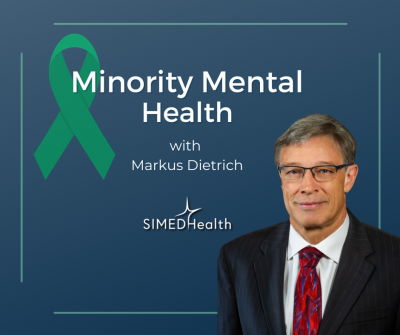
July is observed as National Minority Mental Health Awareness Month, and we discussed these struggles with SIMEDHealth Licensed Mental Health Counselor, Markus Dietrich.
“Approximately 18% of US adults have a mental health diagnosis in any given year, 4% of the affected people have a severe mental illness.” [1] Mental illness does not discriminate by race or gender, even though prevalence of certain diagnoses varies.
Racial and ethnic minority communities face unique struggles regarding mental health problems.
1. What are the challenges racial and ethnic minority communities face regarding mental health illnesses?
Mental health problems still carry a stigma for some. There is a higher stigma regarding mental health in some racial and ethnic groups, making it harder to recognize and identify mental health illnesses. Even when problems are identified, minority communities can be disproportionally affected by certain barriers. Among those are uninsured or under insured accessing services provided in medical settings, capacity issues, waiting lists in publicly funded agencies and a general distrust in healthcare systems. On the provider side a significant issue is a lack of diversity, with 81% of providers being Caucasian. This lack of diversity can manifest in lack of cultural competence and language barriers, making it potentially more difficult for some to find providers they can relate to.
2. Why do some people resist getting help for mental health illnesses?
Mental health issues are still less understood and for some carry a stigma compared to physical illness. Thanks in part to the media, famous entertainers, and influencers have been forthcoming with their own mental health and substance abuse problems; drawing attention to the importance of mental health. Mental illness is not always evident, making it difficult for people to recognize it. When a person is ready for help, it is important that access to treatment is easy and timely.
3. What can one do to help someone struggling with mental health?
Be a friend, listen with the intent to understand, and avoid being judgmental. Showing judgment while someone is expressing their emotions can prevent them in the future from confiding in you. Showing someone support can be simply being a good listener, validating their emotions and letting them know they’re not alone, or helping them find resources and solutions.
4. What are things one can do to boost their mental health?
Even though one might not experience a mental illness like depression or an anxiety disorder, most of us can improve our mental health. Ways to boost your mental health include good self- care, getting enough sleep, eating a healthy diet, exercising regularly, limiting alcohol consumption, and seeking and maintaining healthy relationships.
5. Any additional comments?
Taking care of your health includes physical and mental health. If you’re struggling and need help, reach out to appropriate specialists. Thanks to the wide variety of treatment options available today, most mental illnesses are treatable.
[1] Mental Health Disparities: Diverse Populations, American Psychiatric Association, 2017